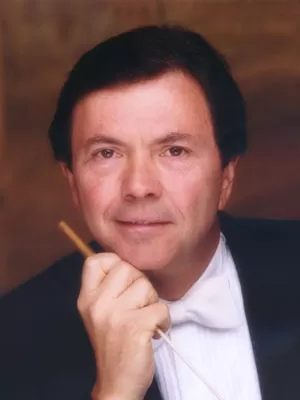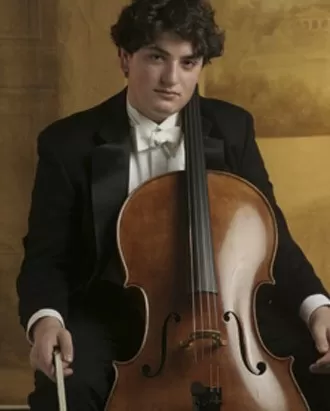Apr 13, 2005 - 12:00 pm
In Memoriam (2005)
Gerard Schwarz (b. Hoboken, New Jersey, 1947)
Gerard Schwarz remarks:
Julian Schwarz
In Memoriam is a work for solo cello and string orchestra (or string quartet), written in memory of a great musician and dear friend, David Tonkonogui. I was very thrilled when my son Julian was chosen to be the first recipient of Music of Remembrance's David Tonkonogui Memorial Award. David meant so much to all of us in our household and was such an inspirational teacher for Julian, fostering his passionate love of music. When Mina Miller, the Artistic Director of Music of Remembrance, and I were discussing what short work Julian would play as part of his prize for the MOR Spring Concert, I suggested that perhaps I could write something. I was very interested in the possibility because of my deep affection for David Tonkonogui and everything that he represented as an artist and as a person. Mina embraced the idea, so during the end of March and beginning of April, I wrote this work.
In Memoriam is basically in three parts: the first section is funereal in spirit, reflecting on the tragedy of death for someone so young and so gifted - and so remarkable. There is a consistent sadness and poignancy in this opening section. The middle section begins with the string quartet and then the material is repeated and embellished in the cello. I wanted this to be positive in feeling, thinking of all the great accomplishments of this wonderful man, individually and as a father and husband. It has a somewhat otherworldly quality but hopefully the experience is uplifting; a tribute to the extraordinary meaning that David Tonkonogui's life meant to all that knew him. Finally, the coda brings back a little part of first section in a much shortened version, which is also much thinner texturally, to end on a single note - the lowest or purest note on the cello.
Divertimento from Gimpel the Fool (1982/85)
David Schiff (b. New York City, 1945)
- Overture/The Rabbi's advice
- Wedding Song
- Bread Song
- Who Knows One? Mazel Tov!
In his 1978 Nobel acceptance speech, Isaac Bashevis Singer argued that storytellers might have the best chance of "rescuing civilization." Singer's best-known story, Gimpel the Fool, is the basis for this work by David Schiff. The story is set in Frampol, a shtetl in 19th-century Poland, but it transcends geography and time. Singer relates the tale of Gimpel, a naïve baker, who responds to a lifetime of betrayal and de-ception with childlike acceptance and faith. The character of Gimpel has been seen by some as a tribute to the stereotypic Eastern European Jew, a simple, suffering type, who accepts what the world hands to him. Despite his suffering, Gimpel is never resentful, and retains a steadfast belief in human goodness. Singer's writing captures a vanished world of Eastern European Jewry, and the richness and wisdom in simple people's lives.
Schiff's Divertimento, composed for Chamber Music Northwest, combines various numbers from his 1979 opera, Gimpel the Fool. The virtuosic character of each of the instruments replaces the voices from the original operatic setting. While the piece has a distinctly Klezmer-like quality, Schiff uses very few folk melodies. One can be heard in the introduction to the "Bread Song."
Notes by Mina Miller © Music of Remembrance
The Seed of Dream (2004)
Lori Laitman (b. Long Beach, NY, 1955)
World premiere: May 9, 2005, Benaroya Hall, Seattle, WA, at Music of Remembrance's Holocaust Re-membrance Concert
Poetry written in the Vilna Ghetto by Abraham Sutzkever (b. Smorgon, near Vilna, 1913)
The Seed of Dream was composed for baritone Erich Parce. It is dedicated to Music of Remembrance's founder and artistic director, Mina Miller.
Pre-World War II Vilna ("Vilnius" in Lithuanian) was often described as the "Jerusalem of Lithuania." For centuries it was one of the great Jewish cultural centers, contributing important modern Hebrew and Yiddish literature, and giving shape to the birth of Zionism and the Jewish Labor Movement.
Germany's invasion of Vilna in June 1941 was followed immediately by a series of anti-Jewish decrees. Within a month, 5,000 Jews were rounded up and taken away. In August and September, 8,000 more Jews were taken to the nearby forest preserve of Ponary and shot. By the end of 1941, the Nazis had al-ready murdered 33,500 of Vilna's 57,000 Jewish residents, and imprisoned the remaining Jews in its two ghettos.
The Vilna Ghetto, even under Nazi rule, did not betray the city's rich cultural heritage. A well-documented artistic life, including musical events and the Ghetto Theatre, attests to the courageous resilience of a decimated community in constant danger of total destruction. Within the Ghetto walls, poetry took on a special importance.
The great Yiddish poet Abraham Sutzkever was imprisoned in the Vilna Ghetto with his wife and mother. He joined the Vilna Ghetto Underground, smuggled weapons and taught Yiddish poetry. As a member of the "Paper Brigade," he risked his life to smuggle out hundreds of rare books and manuscripts. Sutz-kever escaped the ghetto in 1943, and joined a partisan fighters unit. He survived Nazi anti-guerilla of-fensives by taking refuge in the forest and freezing waters of Lake Narocz. In 1944, following the Soviet Army's liberation of Vilna, he was airlifted to Moscow.






